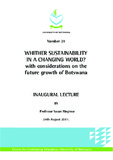| dc.description.abstract | This presentation considers aspects of global sustainability initially in a geological context in order to provide a long-term perspective on global warming and to try and help define what is meant by ‘the natural environment’. Geologically southern Africa is experiencing one of the longest warm/wet (relatively speaking) interglacial periods on record and given the perpetuation of recorded geological cycles, should soon be plunged into the next (cold-dry) glacial period. Hence since ‘the environment’ is constantly changing both in terms of long and short term responses to climatic variability it is relatively difficult to define ‘natural capital’ in realistic, long term trends, especially since the future cold period may be being ameliorated by CO2 induced warming trends which further destabilises the climate. A further geological perspective lets us consider the apparent inevitability of global mass extinctions of terrestrial and aquatic species. This phenomenon has led to significant biodiversity declines several times during the evolution of global species. These mass extinctions were caused mainly by non-biotic factors with only the most recent extinction events being caused by the dominant global inhabitant, Homo sapiens. Humankind is believed to have emerged from the African rift area around 1.3 million years ago and has spread over the planet increasingly modifying its surface area.
Accelerated development has taken place particularly since the last Ice Age when humans became increasingly sedentarised and began to develop crops and keep livestock under the relatively mild conditions of the present benign interglacial era. Favourable climatic conditions to the present day have ultimately culminated in exponential increase in the world’s population since the 1990s, with a present population of around 7 billion. Approximately 40% of the planetary surface is currently dedicated to feeding humankind.
Intensive agriculture has promoted major environmental changes by developing globally a series of agri-ecosystems which may or may not be sustainable as they (along with the rise of industries) have perturbed global biogeochemical cycles – mostly the carbon and nitrogen cycles, but also the phosphorous and sulphur cycles. These both exacerbate and are exacerbated by climate change but significantly the increased pressure on the ‘natural environment’ may well be decreasing the planets ability to continually buffer future change. Technological and biochemical advances promote intensive agriculture at a large social and financial cost such that increasing food (and fuel) prices are one of the major causes of increasing social instability. The effects of these global changes are being dealt with differently in different semi-arid or tropical countries with examples of sustainability
options being taken from mainly Botswana. Research in Botswana has lead to examples of changing environmental conditions over decadal time periods. These examples concentrate on rangeland change with evidence of increasing shrubland development which may be problematic for increasing the national herd size. The sustainable use of drinking water esources in Maun is also considered. However, planning for climatic variability and increased commodity costs in a country such as Botswana requires that major efforts towards attaining better food (and energy) security are essential while establishing a greater range of export commodities to keep the economy stable. While this is essential and maybe sustainable from an economic and social perspective, environmental impacts although hard to quantify, may be less sustainable. The problem with sustainability as a concept is often the lack of baseline data against which to measure economic, social and environmental
sustainability but cost increases globally and human striving for short-term goals tends to ensure that the environment – or ecosystems in general suffer the consequences in a changing world. | en_US |

